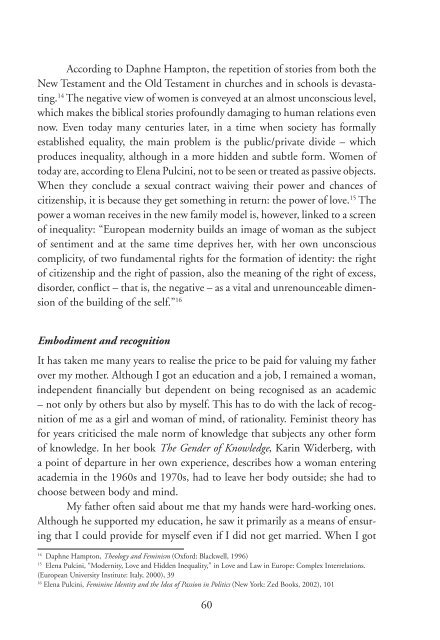Teaching Subjectivity. Travelling Selves for Feminist ... - MailChimp
Teaching Subjectivity. Travelling Selves for Feminist ... - MailChimp
Teaching Subjectivity. Travelling Selves for Feminist ... - MailChimp
You also want an ePaper? Increase the reach of your titles
YUMPU automatically turns print PDFs into web optimized ePapers that Google loves.
According to Daphne Hampton, the repetition of stories from both the<br />
New Testament and the Old Testament in churches and in schools is devastating.<br />
14 The negative view of women is conveyed at an almost unconscious level,<br />
which makes the biblical stories profoundly damaging to human relations even<br />
now. Even today many centuries later, in a time when society has <strong>for</strong>mally<br />
established equality, the main problem is the public/private divide – which<br />
produces inequality, although in a more hidden and subtle <strong>for</strong>m. Women of<br />
today are, according to Elena Pulcini, not to be seen or treated as passive objects.<br />
When they conclude a sexual contract waiving their power and chances of<br />
citizenship, it is because they get something in return: the power of love. 15 The<br />
power a woman receives in the new family model is, however, linked to a screen<br />
of inequality: “European modernity builds an image of woman as the subject<br />
of sentiment and at the same time deprives her, with her own unconscious<br />
complicity, of two fundamental rights <strong>for</strong> the <strong>for</strong>mation of identity: the right<br />
of citizenship and the right of passion, also the meaning of the right of excess,<br />
disorder, conflict – that is, the negative – as a vital and unrenounceable dimension<br />
of the building of the self.” 16<br />
Embodiment and recognition<br />
It has taken me many years to realise the price to be paid <strong>for</strong> valuing my father<br />
over my mother. Although I got an education and a job, I remained a woman,<br />
independent financially but dependent on being recognised as an academic<br />
– not only by others but also by myself. This has to do with the lack of recognition<br />
of me as a girl and woman of mind, of rationality. <strong>Feminist</strong> theory has<br />
<strong>for</strong> years criticised the male norm of knowledge that subjects any other <strong>for</strong>m<br />
of knowledge. In her book The Gender of Knowledge, Karin Widerberg, with<br />
a point of departure in her own experience, describes how a woman entering<br />
academia in the 1960s and 1970s, had to leave her body outside; she had to<br />
choose between body and mind.<br />
My father often said about me that my hands were hard-working ones.<br />
Although he supported my education, he saw it primarily as a means of ensuring<br />
that I could provide <strong>for</strong> myself even if I did not get married. When I got<br />
14<br />
Daphne Hampton, Theology and Feminism (Ox<strong>for</strong>d: Blackwell, 1996)<br />
15<br />
Elena Pulcini, “Modernity, Love and Hidden Inequality,” in Love and Law in Europe: Complex Interrelations.<br />
(European University Institute: Italy, 2000), 39<br />
16<br />
Elena Pulcini, Feminine Identity and the Idea of Passion in Politics (New York: Zed Books, 2002), 101<br />
60

















